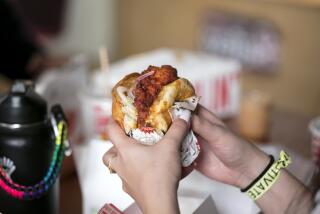BY DESIGN : SHOPPERS’ SPECIAL : New Treatments May Curb Shopping Binges
- Share via
People joke about the need for a shopping fix, but it’s not funny to everyone. Compulsive shopping affects up to 6% of all Americans, mostly women, with perhaps 3 million on the brink of bankruptcy, divorce or both as a result of severe addictions.
Now, a small corps of experts studying the disorder has drawn up a compulsive-shopper profile and has found that antidepressants and other mood-modifying drugs can curb the urge.
The typical compulsive shopper is a 36-year-old woman who, at about age 17, developed the habit of scooping up clothes, shoes, jewelry and/or makeup that often go unused, says Dr. Gary Christenson of the University of Minnesota. He and his colleagues compared 24 compulsive shoppers to 24 people with normal spending patterns, discovering that the compulsive shoppers were more likely to report substance abuse, eating disorders, depression and anxiety. Their findings were published this year in the Journal of Clinical Psychiatry.
A drug called fluvoxamine, developed to treat obsessive-compulsive disorder and not yet approved in the United States, looks promising as a compulsive-shopping treatment, says Dr. Donald W. Black of the University of Iowa College of Medicine. He is leading an eight-week manufacturer-sponsored study of the drug’s effects on 10 shoppers.
So far, he has given it to six women. “Everybody improved,” Black says. “After four or five weeks on the medicine, they were doing well.” They reported fewer shopping urges and ultimately stopped their compulsive shopping.
The drug is believed to work, Black says, by increasing the brain chemical serotonin, which in turn decreases compulsive behavior. But once the drug is withdrawn, the problem seems to resurface. “Three women are off the medicine now and it appears as though they are relapsing,” says Black, who speculates that treatment must be ongoing.
In another study led by Dr. Susan McElroy of the University of Cincinnati, a variety of antidepressants and similar drugs helped quell the shopping urge for nine out of 13 compulsive shoppers, at least temporarily. Fluoxetine (Prozac) and sertraline (Zoloft) were among the antidepressants given by the researchers, whose findings were published in the American Journal of Clinical Psychiatry.






